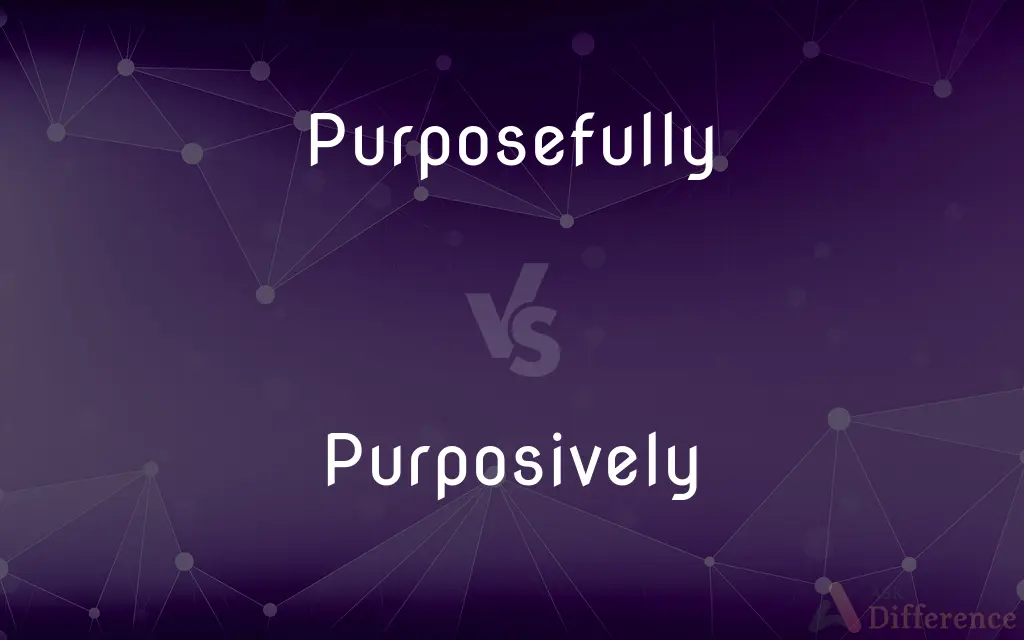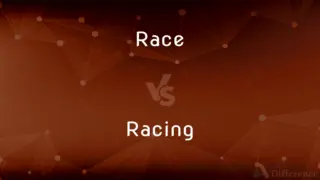Purposefully vs. Purposively — What's the Difference?
By Tayyaba Rehman & Maham Liaqat — Updated on April 22, 2024
Purposefully means doing something with a clear intention or determination, often implying a strong focus or resolve. Purposively implies action taken with a specific purpose or goal in mind, often relating to achieving a desired outcome or effect.

Difference Between Purposefully and Purposively
Table of Contents
ADVERTISEMENT
Key Differences
When someone acts purposefully, they do so with a sense of resolve and determination, often with a strong will or intention. This term emphasizes the manner of the action, characterized by a deliberate and intentional focus. Purposively, in contrast, highlights the intent behind an action rather than the manner of the action itself. It implies that the action is done with a specific purpose or objective in mind, often strategic or goal-oriented.
The distinction can be subtle, as both terms involve intentionality, but purposefully leans more towards the determination and resolve in the conduct, while purposively focuses on the intentionality behind the action, especially in terms of aiming towards a specific goal or outcome.
In practical use, purposefully might be used to describe actions that are done with a noticeable determination or emphasis, suggesting a visible intent in the behavior or task at hand. Purposively is more often used in contexts where the aim or objective of an action is being highlighted, especially in academic, legal, or formal discussions where the purpose behind actions is scrutinized.
The choice between purposefully and purposively can depend on what the speaker wants to emphasize: the determined manner in which an action is carried out, or the specific goal or intent behind the action. Understanding this distinction helps in choosing the most appropriate word to convey the desired nuance in communication.
Comparison Chart
Focus
Manner and resolve in action
Intention and objective behind action
ADVERTISEMENT
Usage
Describes how an action is performed
Describes why an action is performed
Implication
Determination, deliberate focus
Specific goal, designed purpose
Example Sentence
"He walked purposefully towards the podium."
"The regulations were purposively enacted to improve safety."
Compare with Definitions
Purposefully
Acting with determination and focus.
She purposefully navigated through the crowd, her eyes fixed on her destination.
Purposively
Acting with a specific purpose or goal in mind.
The campaign was purposively designed to raise awareness about climate change.
Purposefully
Implies a deliberate manner in undertaking actions.
The team worked purposefully to meet the project deadline.
Purposively
Highlights the intention behind an action.
The law was purposively structured to close existing legal loopholes.
Purposefully
Often associated with visible resolve or effort.
He spoke purposefully, emphasizing each point to ensure clarity.
Purposively
Focuses on the objective rather than the manner of action.
The features were purposively added to enhance the software's usability.
Purposefully
Used to describe assertive or intentional behavior.
She arranged the documents purposefully, preparing for the meeting.
Purposively
Suitable for describing actions driven by a particular aim.
Funds were purposively allocated to the most critical areas of need.
Purposefully
Can convey a sense of intentionality in demeanor.
The leader's purposeful demeanor inspired confidence in the team.
Purposively
Emphasizes the designed or intended outcome of actions.
The study was purposively conducted to test a specific hypothesis.
Purposefully
In a way that shows determination or resolve
Rachael takes the lead, striding purposefully towards the door
Purposively
Having or serving a purpose.
Purposefully
With a useful purpose
How is it possible to share information effectively and purposefully with project partners?
Purposively
Purposeful
Purposive behavior.
Purposefully
Intentionally and deliberately
Purposefully vague answers
We purposefully avoided addressing the problem
Purposively
In a purposive manner.
Purposefully
Having a purpose; intentional
A purposeful musician.
Purposefully
Having or manifesting purpose; determined
Entered the room with a purposeful look.
Purposefully
In a purposeful manner.
Purposefully
(proscribed) On purpose, purposely, deliberately.
Common Curiosities
Can "purposefully" and "purposively" be used interchangeably?
While there is some overlap, they are not always interchangeable due to the subtle difference in focus between the manner of action (purposefully) and the intention behind the action (purposively).
Is "purposively" used more in legal or formal contexts?
"Purposively" is often used in contexts where the focus is on the intent behind policies, laws, or designed actions, making it common in legal, academic, and formal discussions.
Is "purposefully" more about attitude than "purposively"?
Yes, "purposefully" often implies a certain attitude or demeanor, such as determination or resolve, whereas "purposively" is more about the intention or aim behind an action.
Does "purposefully" imply success in achieving the intended goal?
Not necessarily; "purposefully" emphasizes the manner of approach, such as determination or resolve, which doesn't always guarantee the successful achievement of the intended goal.
Can the misuse of "purposefully" and "purposively" lead to misunderstandings?
While their meanings are closely related, incorrect use could lead to slight misunderstandings about whether the emphasis is on the manner of action or the underlying intent.
How do I choose between "purposefully" and "purposively"?
Consider whether you want to emphasize the determined manner in which something is done (purposefully) or the specific intent or goal behind the action (purposively).
Are there contexts where only one of the terms is appropriate?
Yes, in contexts strictly focusing on the determined manner of an action without regard to specific goals, "purposefully" is more appropriate. Conversely, "purposively" is better suited for discussions centered on the intent or rationale behind actions.
Can the choice between "purposefully" and "purposively" change the perceived motive of an action?
Yes, "purposefully" might suggest a more determined or forceful approach, while "purposively" can imply a more calculated or rationale-driven action, affecting the perceived motive.
Is "purposefully" more about the execution of an action, while "purposively" is about the planning?
Generally, yes. "Purposefully" often relates to the execution with resolve or determination, while "purposively" relates more to the planning or reasoning behind the action.
How do "purposefully" and "purposively" contribute to the clarity of communication?
Their precise use can enhance communication by clearly indicating whether
How does the use of "purposively" affect the interpretation of a sentence?
Using "purposively" can shift the focus of a sentence towards the underlying purpose or goal of an action, highlighting the deliberate intention behind it.
Can an action be both purposeful and purposive?
Yes, an action can be both purposeful in its determined manner and purposive in its intended goal, combining both the resolve in action and the clarity of objective.
How does "purposively" relate to the concept of purpose in an action?
"Purposively" directly relates to having a specific purpose or objective that guides the action, emphasizing the intentionality behind it.
Share Your Discovery

Previous Comparison
Culmination vs. Zenith
Next Comparison
Race vs. RacingAuthor Spotlight
Written by
Tayyaba RehmanTayyaba Rehman is a distinguished writer, currently serving as a primary contributor to askdifference.com. As a researcher in semantics and etymology, Tayyaba's passion for the complexity of languages and their distinctions has found a perfect home on the platform. Tayyaba delves into the intricacies of language, distinguishing between commonly confused words and phrases, thereby providing clarity for readers worldwide.
Co-written by
Maham Liaqat














































